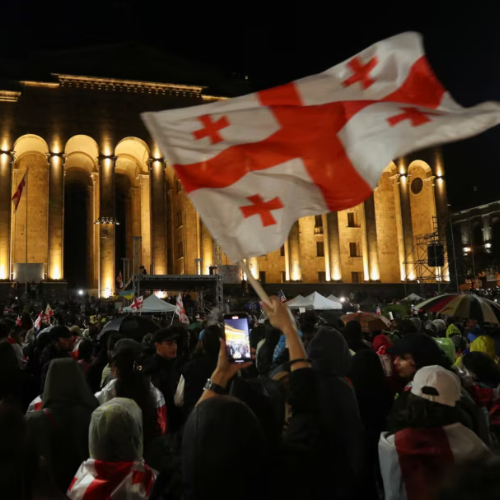In recent weeks, the streets of Tbilisi, Georgia’s capital, have been filled with protests. Thousands of people are angry about their government’s decision to delay discussions about joining the European Union (EU) until 2028. For many Georgians, EU membership represents a brighter future—a future with stronger democracy, better human rights, and closer ties with Europe.
The announcement came as a shock to citizens who overwhelmingly support EU integration. Protesters took to the streets, holding signs and chanting slogans like “We choose Europe!” The decision to postpone EU talks has been viewed by many as a betrayal of Georgia’s European aspirations.
However, the government’s response to these peaceful protests has drawn sharp criticism. Instead of engaging in dialogue with demonstrators, the authorities cracked down on them. Witnesses and reports reveal that riot police used tear gas and other aggressive measures to disperse the crowds. Many protesters were hurt, and the images of the crackdown have caused outrage both within Georgia and internationally.
Baltic States Take Action
The violent suppression of peaceful protests in Georgia has not gone unnoticed. Three small but determined European countries—Lithuania, Latvia, and Estonia—have taken a bold step in response. Together, they announced that they will impose national sanctions on those responsible for the suppression of protesters in Georgia.
Sanctions are serious measures that can include banning individuals from entering certain countries or freezing their financial assets. These sanctions are not directed at the Georgian people but at specific officials and others who played a role in violating the rights of the demonstrators.
The Baltic states are no strangers to the struggles for democracy and freedom. These countries, which gained independence from Soviet control in the early 1990s, know how important it is to protect people’s rights to speak out and protest. By imposing sanctions, Lithuania, Latvia, and Estonia are standing in solidarity with the Georgian people, sending a clear message that human rights violations will not be tolerated.
Georgian Government Faces U.S. Sanctions Amid Controversial Law and Violent Protests
The Baltic leaders have emphasized that those who suppress peaceful protests are not welcome in their countries. They are taking this action to show their support for democracy and their disapproval of the Georgian government’s use of force.
Europe’s Concern Over Georgia
The Baltic states are not alone in voicing concerns about the situation in Georgia. Leaders across the European Union have spoken out about the protests and the government’s actions. The EU itself has issued a warning, stating that the decision to delay EU membership talks, combined with the use of force against demonstrators, will have consequences.
EU representatives have made it clear that the Georgian people’s desire for a European future is undeniable. They view the protests as an expression of this choice and have condemned the government’s violent crackdown as a step in the wrong direction.
For years, the EU has supported Georgia in its efforts to modernize and align with European values. But this latest decision to postpone EU talks and the government’s handling of the protests have raised questions about whether it is truly committed to the path of European integration.
The sanctions announced by the Baltic states and the EU’s warnings come at a critical time. They highlight a broader concern about what these recent events mean for Georgia’s future. The international community is closely watching the actions of the Georgian government.
The protesters, however, remain determined. They continue to gather in large numbers, chanting and waving EU flags, calling for a government that will respect their choice for a European future. The support from the Baltic states and other European countries has been seen as a sign that their voices are being heard, even beyond their borders.
For now, the focus remains on the individuals responsible for the protest suppression. By imposing these sanctions, the Baltic states have taken a stand against actions that go against the core principles of democracy. The protests in Georgia serve as a reminder of the ongoing fight for freedom and the power of people’s voices, even in the face of opposition.


